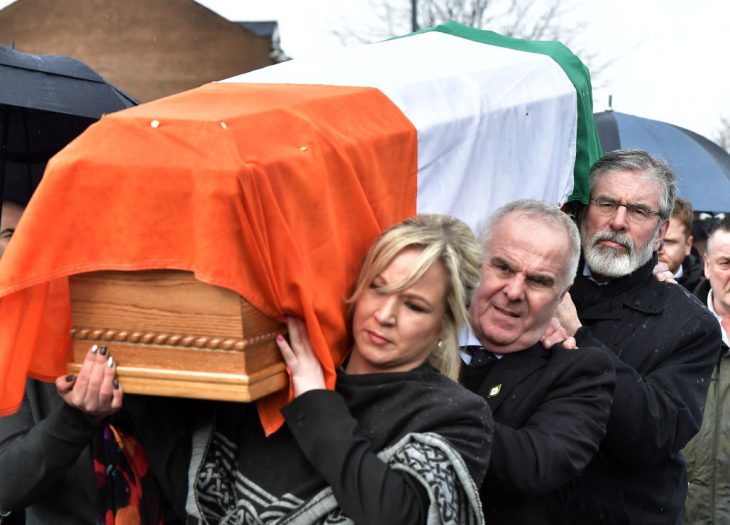Well the obituaries for Martin McGuinness are in. And many are as morally illiterate as the man himself could have wished for. For instance, various obituarists have noted that the young McGuinness’s failure as a young man to get an apprenticeship as a mechanic started him off on the road to terror. Few of these eulogists have noted the many people across continents and generations who also failed to get apprenticeships (often for even more sectarian reasons) and yet strangely refused as a consequence to pick up some pliers and an Armalite and torture and kill their way to political power.
Other obsequies have been even stranger. Alex Salmond, for instance – perhaps recognising a fellow nationalist – praised Martin McGuinness as ‘a friend of Scotland’.
While recognising that Scottish Nationalists must claim their friends where they can these days, whatever his stance towards Scottish nationalism, McGuinness was not, of course, such a good friend to Scots. For instance he was not a friend to Peter Deacon Sime of Glasgow, shot by the IRA while on duty with the King’s Own Scottish Borderers in West Belfast in April 1972. The 22-year old Lance-Corporal Sime left a wife and an 18-month old child.
Nor was Martin McGuinness a great friend to the Glasgow-born 21-year old Paul Jackson. On the 28th November 1972 the organisation McGuinness was then heading chose to put a bomb at Long’s supermarket on Strand Road in Londonderry. Gunner Jackson was part of a bomb disposal team which went to disarm the device, but it exploded when they arrived, shattering his skull and killing the married father of two.
Nor was McGuinness a good friend to John Gibbons of Edinburgh who was killed on 5 May 1973 by a roadside bomb planted in Armagh by the IRA. Trooper Gibbons was 22 and married with one child.
Details, I know. But the list can – and does – go on and on. Not just the list of Scots, but the list of people from across these islands who lost their lives because of the IRA. And though one might have endless admiration and indeed awe for those people who lost a loved one and learned how to forgive the murderers, it requires an act of exceptional moral presumption to forgive the murderers on behalf of the bereaved, as our society now seems intent on doing.
‘But what about the violence on all sides’ some people keep demanding, as though those of us who deplore one set of murderers must by some necessity approve of another. This historical and moral ignorance matters, because it is at moments such as this, in consideration of past violence, that our attitudes towards present and future violence will be formed.
Presently it is being made to appear as though there is something not just uncharitable but churlish in not admiring a man who spent the best years of his life torturing and killing people only then – when the possibility of achieving his ‘goal’ looked further off than ever – for the same man to choose not to torture and kill people any longer. As I have pointed out many times over the years, the people to be admired in the Troubles are not the ones who butchered people and then decided to stop butchering people, but the people who never started butchering people in the first place.
My new colleague Stephen Daisley seems to regret the inability of people like me to recognise that it was only the people with guns who had power to give up. But if such regret exists it is because many of us with knowledge and experience of the conflict in Northern Ireland can point to too many people who abjured violence and thuggery throughout and who were continuously and consistently cast aside by a political process which seemed at times almost deliriously intent on rewarding the men of violence. To us it does not appear an inevitability that all that hatred should have been whipped up for all those years by the likes of Martin McGuinness and Ian Paisley only for the two of them to reconcile at the last and carve up all the political power between themselves. Whether or not the devil has the best tunes, he definitely turns out to have the darkest jokes.
As the obituaries of his ‘chuckle-brother’ also showed, McGuinness was fortunate to live into an age of such moral ineptitude. Like Gerry Adams and Alex Salmond, he lived into an era when you just had to talk the language of left-wing social justice to persuade a new generation of people that your life’s ambitions had mainly been in the realm of LGBT equality and a reduction of the wage-gap in order for your lifelong pursuit of bitter and bloody sectarian conflict to be overlooked. Even more strangely it is the victims of McGuinness and his organisation (like Lord Tebbit, who lives every day with the effects of the IRA’s ‘war’) who are now portrayed as the ‘ungenerous’ and hard-hearted ones.
Yet there is one bright light. For now that McGuinness is gone, perhaps we will finally get to the bottom of some other truths about him and his career and why he was indeed so very lucky. As I pointed out in the Spectator six years ago, the British government somewhere has the files on McGuinness’s involvement in multiple murders, in particular his involvement in the killing of Frank Hegarty. The government of John Major deliberately ‘disappeared’ these files in order to pursue their negotiations with the almost defeated IRA (the now textbook example of snatching defeat from the jaws of victory). And as I imply in my book on the Bloody Sunday Inquiry there are many facts around McGuinness’s involvement on that and many other days which are yet to come out. They were never going to come out in McGuinness’s lifetime, but perhaps we can now hope that they will come out in ours.






Comments